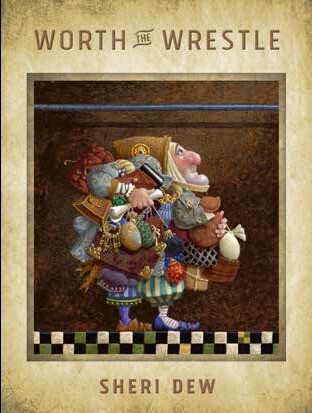The following article originally ran on LDS Living in May 2015.
Men and women of faith are required to have faith. Yet learning to walk by faith is surely one of the most difficult transitions we make as mortals. Our natural tendency is to want answers. We like things tied up neatly with a bow—although almost nothing ever is. We don’t like or always know how to respond to ambiguity. The simple but agonizing fact is that followers of Jesus Christ are required to walk by faith, to at least some degree, and there is nothing easy about it.
Gratefully, we are not left alone in the quest to increase our faith. The Lord told Joseph Smith that one reason the Church was restored was so that “faith also might increase in the earth” (D&C 1:21), and that those who served Him “in righteousness and in truth” would be eligible to learn “all mysteries, yea, all the hidden mysteries of my kingdom from days of old, and for ages to come. . . . Yea, even the wonders of eternity shall they know” (D&C 76:5, 7–8).
The very process of wrestling with sincere questions, and learning more and more about how God works, is fundamental to building and increasing our faith. Although the Lord will reveal many things to us, He has never told His covenant people everything about everything. We are admonished to “doubt not, but be believing” (Mormon 9:27).
But “doubting not” does not mean understanding everything—including His timing. It means not doubting that God knows more than we do—that “all things have been [and are] done in the wisdom of him who knoweth all things” (2 Nephi 2:24). It means, as King Benjamin admonished his people, believing that God is, “that he created all things, both in heaven and in earth; [believing] that he has all wisdom, and all power, both in heaven and in earth; [believing] that man doth not comprehend all the things which the Lord can comprehend” (Mosiah 4:9). It also means understanding that there will be challenges to the Lord’s people and to His Church. . . .
Thus, doubting is not synonymous with the pursuit of truth, nor is it the same as asking questions. To doubt is to reject truth and faith. Further, there is a spirit of doubt that the adversary uses very effectively. It has more to do with temptation than it does with a lack of faith, though it can look and feel as though it is the latter. At its most fundamental level, doubting means doubting the Father and His Son. As covenant sons and daughters—as people of faith—we are required to have faith, to live by faith, to “ask in faith, nothing wavering” (James 1:6), and to “overcome by faith” (D&C 76:53). These repeated admonitions to build our faith are crucial because it is much easier to sow doubt than to build faith and to learn by faith. When all is said and done, learning by faith is as crucial as learning by study, because there are some things we cannot learn from a book.
Elder Dallin H. Oaks underscored this truth: “After all we can publish, our members are sometimes left with basic questions that cannot be resolved by study. . . . Some things can be learned only by faith. Our ultimate reliance must be on faith in the witness we have received from the Holy Ghost” (“Opposition in All Things,” Ensign, May 2016).
President Harold B. Lee said something similar: “It is not the function of religion to answer all the questions about God’s moral government of the universe, but to give one courage, through faith, to go on in the face of questions he never finds the answer to in his present status” (in Conference Report, October 1963, 108.)
And in an address to Church Educational System administrators and teachers, Elder Jeffrey R. Holland delivered this stirring declaration about the relationship of questions to revealed truth: “Not all gospel questions have answers—yet—but they will come. In the meantime, I have a question. What conceivable historical or doctrinal or procedural issue that may arise among any group could ever overshadow or negate one’s consuming spiritual conviction regarding the Father’s merciful plan of salvation; His Only Begotten Son’s birth, mission, Atonement, and Resurrection; the reality of the First Vision; the restoration of the priesthood; the receipt of divine revelation, both personally and institutionally; the soul-shaping spirit and moving power of the Book of Mormon; the awe and majesty of the temple endowment; one’s own personal experience with true miracles; and on and on and on? Talk about a question! It is a mystery to me how those majestic, eternal, first-level truths so central to the grandeur of the whole gospel message can be set aside or completely dismissed by some in favor of obsessing over second- or third- or fourth-level pieces of that whole. To me, this is, in words attributed to Edith Wharton, truly being trapped in ‘the thick of thin things’” (“Be Not Afraid, Only Believe,” Address to Church Educational System Religious Educators, 6 February 2015).
All questions have answers. But some questions, be they personal, doctrinal, or procedural, may not be answered until later. Some may not be answered in this life. Some ambiguity about the way God works with His children and in the governance of His Church may always exist. And certainly, some ironies, the likes of which we find frequently in scripture—such as “the first shall be last” and “lose your life to find it”—may always typify our lives here. . . .
Consider the verse that sent Joseph to the grove: “If any of you lack wisdom, let him ask of God, that giveth to all men liberally, and upbraideth not; and it shall be given him.” James then added this stipulation: “But let him ask in faith, nothing wavering” (James 1:5–6; emphasis added).
Thus, once the Spirit has borne witness to you of truth, particularly the foundational truths that comprise a testimony—that God is our Father, that Jesus is the Christ, that Joseph Smith was the prophet called to restore the Savior’s gospel, that the Book of Mormon is scripture, and that we are led by prophets, seers, and revelators today—then you know the gospel is true. You have a testimony! And even though you do not know or understand all things, you can feel secure in what you do know! . . .
At that point, when questions arise or when blessings you’ve been pleading for remain unfulfilled, these issues are not an indication that you don’t have a testimony or that the gospel is not true. They are an invitation for you to grow spiritually.
Sometimes we become confused about the intersection of questions and testimony and attempt to connect them when they are not necessarily related. Questions should never threaten a testimony; they should only help build conviction, deepen understanding, and increase faith—because they provide the opportunity to learn.
Admittedly, it can sometimes feel as though our questions about doctrine or Church procedures or the Church’s history or unfulfilled personal blessings are somehow connected to our testimonies. If you have been pleading for healing or marriage or a child without a fulfillment of those pleadings, it can be tempting to wonder if God is real, if He’s listening, or if He cares. And if Church doctrine on a particular issue conflicts with your personal views, it can feel confusing. If certain procedures or practices in the Church puzzle you, it can feel discouraging. Any of those emotions or sensations, left in isolation, can threaten testimony.
But I repeat: Once you have received a spiritual witness of the truths that form the foundation of a testimony, then when questions arise—even the thorniest questions about our doctrine or history or positions on sensitive issues, or the aching desires of our hearts—they are opportunities for personal, spiritual growth. They are not red flags suggesting that the gospel isn’t true. They are opportunities to engage in the wrestle for inspired answers, receive personal revelation, and increase faith.
Lead image from Getty Images
In Worth the Wrestle, Sheri examines the process of asking good questions—whether those questions be doctrinal, procedural, historical, or intensely personal—and learning how to get answers. She demonstrates how to live by faith while seeking greater light and knowledge. And she testifies of principles that are worth wrestling for and of understanding that can be gained in no other way.





